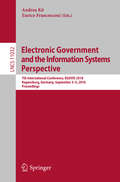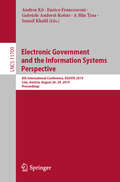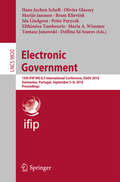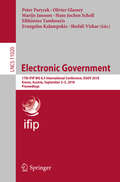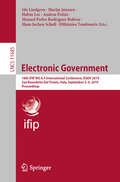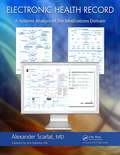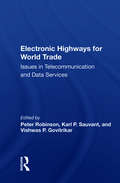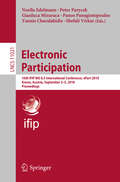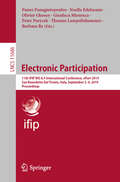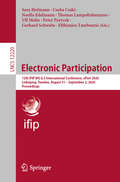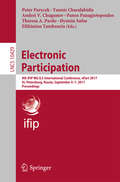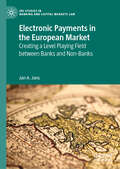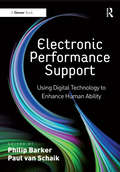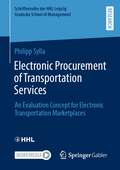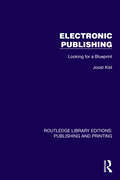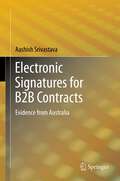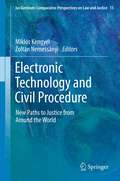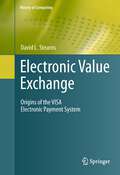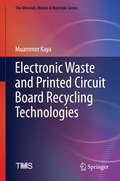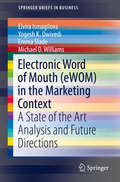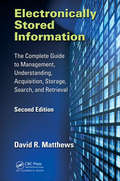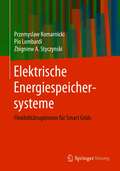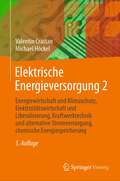- Table View
- List View
Electronic Government and the Information Systems Perspective: 7th International Conference, EGOVIS 2018, Regensburg, Germany, September 3–5, 2018, Proceedings (Lecture Notes in Computer Science #11032)
by Enrico Francesconi Andrea KőThis book constitutes the refereed proceedings of the 7th International Conference on Electronic Government and the Information Systems Perspective, EGOVIS 2018, held in Regensburg, Germany, in September 2018. The 19 revised full papers presented were carefully reviewed and selected from 22 submissions. The papers are organized in the following topical sections: digitalization and transparency; challenges in e-government technology and e-voting; knowledge management in the context of e-government; semantic technologies and the legal aspects; open data and open innovation; and e-government cases - data and knowledge management.
Electronic Government and the Information Systems Perspective: 8th International Conference, EGOVIS 2019, Linz, Austria, August 26–29, 2019, Proceedings (Lecture Notes in Computer Science #11709)
by Enrico Francesconi Andrea Kő Ismail Khalil A Min Tjoa Gabriele Anderst-KotsisThis book constitutes the refereed proceedings of the 8th International Conference on Electronic Government and the Information Systems Perspective, EGOVIS 2019, held in Linz, Austria, in August 2019. The 17 full papers presented were carefully reviewed and selected from 25 submissions. The papers are organized in the following topical sections: open data and open innovation; data-driven approaches in e-government; e-government cases – data and knowledge management; e-government theoretical background; and digitalization and transparency.
Electronic Government: 15th IFIP WG 8.5 International Conference, EGOV 2016, Guimarães, Portugal, September 5-8, 2016, Proceedings (Lecture Notes in Computer Science #9820)
by Efthimios Tambouris Maria A. Wimmer Delfina Sá Soares Tomasz Janowski Hans Jochen Scholl Marijn Janssen Bram Klievink Ida Lindgren Peter Parycek Olivier GlasseyThis book constitutes the refereed proceedings of the 15th IFIP WG 8.5 International Conference on Electronic Government, EGOV 2016, held in Guimaraes, Portugal, in September 2016, in conjunction with the 8th International Conference on eParticipation, ePart 2016. The 24 revised full papers presented were carefully reviewed and selected from 87 submissions. The papers are clustered under the following topical sections: foundations; benchmarking and evaluation; information integration and governance; services; evaluation and public values; EGOV success and failure; governance; social media; engagement; processes; policy-making; trust, transparency and accountability; open government and big/open data; smart government/governance/cities.
Electronic Government: 17th IFIP WG 8.5 International Conference, EGOV 2018, Krems, Austria, September 3-5, 2018, Proceedings (Lecture Notes in Computer Science #11020)
by Efthimios Tambouris Hans Jochen Scholl Marijn Janssen Peter Parycek Olivier Glassey Evangelos Kalampokis Shefali VirkarThis book constitutes the proceedings of the 17th IFIP WG 8.5 International Conference on Electronic Government, EGOV 2018, held in Krems, Austria, in September 2018, in conjunction with the 10th International Conference on eParticipation, ePart 2018.The 22 revised full papers presented were carefully reviewed and selected from 48 submissions. The papers are clustered under the following topical sections: General E-Government and Open Government; Open Data, Linked Data, and Semantic Web; Smart Governance (Government, Cities and Regions); and Artificial Intelligence, Data Analytics and Automated Decision-Making.
Electronic Government: 18th IFIP WG 8.5 International Conference, EGOV 2019, San Benedetto Del Tronto, Italy, September 2–4, 2019, Proceedings (Lecture Notes in Computer Science #11685)
by Efthimios Tambouris Hans Jochen Scholl Marijn Janssen Ida Lindgren Manuel Pedro Rodríguez Bolívar Habin Lee Andrea PoliniThis book constitutes the proceedings of the 18th IFIP WG 8.5 International Conference on Electronic Government, EGOV 2019, held in San Benedetto del Tronto, Italy, in September 2019, in conjunction with the IFIP WG 8.5 IFIP International Conference on Electronic Participation (ePart 2019) and the International Conference for E-Democracy and Open Government Conference (CeDEM 2019).The 27 revised full papers presented were carefully reviewed and selected from 64 submissions. The papers are clustered under the following topical sections: E-Government Foundations; E-Government Services and Open Government; Open Data: Social and Technical Aspects; AI, Data Analytics and Automated Decision Making; and Smart Cities.
Electronic Health Record: A Systems Analysis of the Medications Domain
by MD, Alexander ScarlatAn accessible primer, Electronic Health Record: A Systems Analysis of the Medications Domain introduces the tools and methodology of Structured Systems Analysis as well as the nuances of the Medications domain. The first part of the book provides a top-down decomposition along two main paths: data in motion workflows, processes, activities, and tas
Electronic Highways For World Trade: Issues In Telecommunication And Data Services
by Peter Robinson Karl P. Sauvant Vishwas P. GovitrikarThis book explains the negotiations on an international framework for trade in services, undertaken in the Group of Negotiations on Services of the Uruguay Round, and the international discussions on transborder data flows and telecommunication regulation in a number of international fora.
Electronic Markets
by Craig StandingThe growth of the internet has created huge opportunities for organizations to tap into thenew electronicmarkets and developinnovative and improved business relationships. This book examines the developments in electronic markets in relation to three key areas: online retailing, electronic collaboration and electronic marketplaces. Each chapter is authored by leaders in their field providing cutting edge perspectives on how to take advantage of electronic markets. Itis relevant for researchers as a research source and academics andteachers who require a book that covers the main areas of electronic markets. The contents also provide practitioners with insights and theories with which to develop their own organizations. "
Electronic Participation: 10th IFIP WG 8.5 International Conference, ePart 2018, Krems, Austria, September 3-5, 2018, Proceedings (Lecture Notes in Computer Science #11021)
by Panos Panagiotopoulos Yannis Charalabidis Peter Parycek Shefali Virkar Noella Edelmann Gianluca MisuracaThis book constitutes the proceedings of the 10th IFIP WG 8.5 International Conference on Electronic Participation, ePart 2018, held in Krems, Austria, in September 2018.The 12 revised full papers presented in this book were carefully reviewed and selected from 29 submissions. The papers are clustered under the following topical sections: general e-democracy and e-participation; digital collaboration and social media; policy modeling and policy informatics; and social innovation.
Electronic Participation: 11th IFIP WG 8.5 International Conference, ePart 2019, San Benedetto Del Tronto, Italy, September 2–4, 2019, Proceedings (Lecture Notes in Computer Science #11686)
by Panos Panagiotopoulos Peter Parycek Olivier Glassey Noella Edelmann Gianluca Misuraca Thomas Lampoltshammer Barbara ReThis book constitutes the proceedings of the 11th IFIP WG 8.5 International Conference on Electronic Participation, ePart 2019, held in San Benedetto del Tronto, Italy, in September 2019, in conjunction with the 18th IFIP WG 8.5 IFIP International Conference on Electronic Government (EGOV 2019) and the International Conference for E-Democracy and Open Government Conference (CeDEM 2019).The 13 revised full papers presented were carefully reviewed and selected from 26 submissions. The papers are clustered under the following topical sections: eParticipation Developments; Digital Transformations; Crisis and Emergency Management; and User Perspectives.
Electronic Participation: 12th IFIP WG 8.5 International Conference, ePart 2020, Linköping, Sweden, August 31 – September 2, 2020, Proceedings (Lecture Notes in Computer Science #12220)
by Sara Hofmann Efthimios Tambouris Peter Parycek Noella Edelmann Thomas Lampoltshammer Csaba Csáki Ulf Melin Gerhard SchwabeThis book constitutes the proceedings of the 12th IFIP WG 8.5 International Conference on Electronic Participation, ePart 2019, held in Linköping, Sweden, in August/September 2020, in conjunction with the 19th IFIP WG 8.5 IFIP International Conference on Electronic Government (EGOV 2020) and the International Conference for E-Democracy and Open Government Conference (CeDEM 2020). The conference was held virtually due to the COVID-19 pandemic. The 11 full papers presented were carefully reviewed and selected from 33 submissions. The papers are clustered under the following topical sections: eParticipation developments; digital transformation; open government and transparency; and user perspectives.
Electronic Participation: 9th IFIP WG 8.5 International Conference, ePart 2017, St. Petersburg, Russia, September 4-7, 2017, Proceedings (Lecture Notes in Computer Science #10429)
by Peter Parycek, Yannis Charalabidis, Andrei V. Chugunov, Panos Panagiotopoulos, Theresa A. Pardo, Øystein Sæbø and Efthimios TambourisThis book constitutes the proceedings of the 9th IFIP WG 8.5 International Conference on Electronic Participation, ePart 2017, held in St. Petersburg, Russia, in September 2017.The 11 revised full papers presented in this book were carefully reviewed and selected from 14 submissions. The papers reflect completed multi-disciplinary research ranging from policy analysis and conceptual modeling to programming and visualization of simulation models. They are organized in four topical threads: methodological issues in e-participation; e-participation implementations; policy modeling and policy informatics; critical reflections.
Electronic Payments in the European Market: Creating a Level Playing Field between Banks and Non-Banks (EBI Studies in Banking and Capital Markets Law)
by Jan A. JansThis book offers a holistic approach to the level playing field concept that takes into account six regulatory objectives of the European financial services regulatory framework for banks and non-banks. These intermediate objectives are: (i) facilitating market access by non-banks to provide payment services; (ii) safeguarding the security of the payments market; (iii) safeguarding the integrity of the payments market; (iv) enhancing consumer protection in case of an unauthorised or erroneous payments; (v) allowing non-banks access to payment systems; and (vi) facilitating collaboration between competing payment service providers to develop standards for the payments market that reflect the interests of both banks and non-banks. The book discusses the rules and regulations covering these intermediate objectives to determine the extent to which there is a level playing field between banks and non-banks. In addition, the book provides high-level summaries of competition law requirements and related case law, and will be of interest to researchers, academics, and financial law practitioners.
Electronic Performance Support: Using Digital Technology to Enhance Human Ability
by Paul van SchaikDespite ubiquitous powerful technologies such as networked computers, global positioning systems, and cell phones; human failures in decision-making and performance continue to have disastrous consequences. Electronic Performance Support: Using Digital Technology to Enhance Human Ability, reminds everyone involved in education, training, human performance engineering, and related fields of the enormous importance of this area. Ironically, the more complex technology becomes, the more performance support may be needed, and that's why the extraordinary expertise shared in this book is especially valuable. The authors emphasize the psychological aspects of performance support, the fundamental limitations of human memory, perception, cognition, conation, and psychomotor skills and how they can be reduced through electronic performance support, as one of the most important pursuits of this century. Readers will find the material presented extremely useful because of its generic basis - which underlines much of the contemporary use of electronic technology for supporting people who are engaged in problem-solving activities. At the same time, the book gives examples of the application of electronic performance support in a number of specific domains. Possible future developments for electronic performance support are also discussed. The technological challenges we face today, both globally and locally, are more urgent than most people seem willing to acknowledge, and there is no time to waste putting the ideas expressed in this book into action.
Electronic Procurement of Transportation Services: An Evaluation Concept for Electronic Transportation Marketplaces (Schriftenreihe der HHL Leipzig Graduate School of Management)
by Philipp SyllaThis book deals with the electronic procurement of transportation services. It provides an overview of the fundamentals for the procurement of transportation services, including the relevant objectives, involved parties, and processes. A focus is set on Electronic Transportation Marketplaces (ETMs) which offer main functionalities for the procurement of transportation services on the spot and contract market as well as additional functionalities to improve further processes (e.g., time-slot management). Even though such marketplaces are important from an economic and ecological perspective, previous research provides only little knowledge about the status quo of their use, the determinants of marketplace use and the link between this use and business value. To close these research gaps, Philipp Sylla builds a comprehensive conceptual research framework and conducts an empirical analysis based on a web survey of shippers in Germany. The empirical results build the foundation for the development of an evaluation concept that provides practical support for shippers in the assessment of marketplace use and the evaluation of potential business value impacts.
Electronic Publishing: Looking for a Blueprint (Routledge Library Editions: Publishing and Printing)
by Joost KistWith the development of new technologies over the previous decade and more moderately priced and faster systems becoming available Electronic Publishing, originally published in 1987, provided a much-needed close look at present and potential publishing techniques at the time. In the view of the author the relatively new electronic and optical media were expected to integrate with or supplement flourishing media such as books, looseleaf publications and journals.The aim of this book was to guide those people confronted with the new information technology, be they professionals or the generally interested reader, through the complex problems associated with this medium. Topics covered include: the sources from which information may be obtained, which channels and delivery systems should be used, and the problem of abstracting the mass of information available. Emphasis is on the new user and the author attempts to formulate a new appreciation of informational content as a vital source for society. Today, with electronic publishing at the forefront of the publishing industry as a whole, it can be read in its historical context.
Electronic Signatures for B2B Contracts: Evidence from Australia
by Aashish SrivastavaThe last few centuries have seen paper-based documents and manuscript signatures dominate the way businesses enter into a contractual relationship with each other. With the advent of Internet, replacing paper-based contracts with B2B electronic contracts is a possibility. However, an appropriate technology and an enabling legislation are crucial for this change to happen. On the technology front this feature has the potential to enable business executives to sit in front of their computer and sign multi-million dollar deals by using their electronic signatures. On the legal front various pieces of legislation have been enacted and policies developed at both national and international levels to give legal recognition to such type of contracts. This book presents the findings of an empirical study on large public listed Australian companies that examined businesses' perception towards the use of electronic signatures in B2B contracts. Essentially, it identifies six key factors that create a disincentive to businesses to move from the practice of paper- based signatures to the new technology of electronic signatures. This book offers legal practitioners, academics and businesses insights into issues associated with the use of electronic signatures and suggests a number of measures to promote its usage in B2B contracts.
Electronic Technologies in the Information Mosaic: Where Managers Find Information
by William J. Bruns Jr. Sharon M. MckinnonAvailable technology should be a part of the solutions to serving managers' information needs, but technology alone will not guarantee better information for managers. It is important to design systems with managers' needs and preferences in mind.
Electronic Technology and Civil Procedure
by Zoltán Nemessányi Miklós KengyelThe effect of modern and communication technology on civil procedure first appeared on the agenda of the conference organized by the International Association of Procedural Law in 1999, verifying Lord Woolf's statement from the 90's, that "IT will not only assist in streamlining and improving our existing systems and process; it is also likely, in due course, itself to be catalyst for radical change as well...". At the conference in Pecs in the autumn of 2010 participants from three continents and twenty-five countries examined all aspects of the impact of modern information technology on civil procedure beginning with the electronic submission of the application, ranging from electronic service of documents and electronic means of proof supported by modern information technology. In addition to the practical issues they discussed the possible impact of electronic procedures on traditional principles of civil procedure. The conference book contains seven main reports and eleven correferates, the foreword was written by Prof. Peter Gottwald, the President of the International Association of Procedural Law.
Electronic Value Exchange
by David L. StearnsElectronic Value Exchange examines in detail the transformation of the VISA electronic payment system from a collection of non-integrated, localized, paper-based bank credit card programs into the cooperative, global, electronic value exchange network it is today. Topics and features: provides a history of the VISA system from the mid-1960s to the early 1980s; presents a historical narrative based on research gathered from personal documents and interviews with key actors; investigates, for the first time, both the technological and social infrastructures necessary for the VISA system to operate; supplies a detailed case study, highlighting the mutual shaping of technology and social relations, and the influence that earlier information processing practices have on the way firms adopt computers and telecommunications; examines how "gateways" in transactional networks can reinforce or undermine established social boundaries, and reviews the establishment of trust in new payment devices.
Electronic Waste and Printed Circuit Board Recycling Technologies (The Minerals, Metals & Materials Series)
by Muammer KayaThis book covers state-of-the-art technologies, principles, methods and industrial applications of electronic waste (e-waste) and waste PCB (WPCB) recycling. It focuses on cutting-edge mechanical separation processes and pyro- and hydro-metallurgical treatment methods. De-soldering, selective dismantling, and dry separation methods (including the use of gravity, magnetic and electrostatic techniques) are discussed in detail, noting the patents related to each. The volume discusses the available industrial equipment and plant flowsheets used for WPCB recycling in detail, while addressing potential future directions of the field. This practical, comprehensive, and multidisciplinary reference will appeal to professionals throughout global industrial, academic and government institutions interested in addressing the growing problem of e-waste. Covers principles, methods and industrial applications of e-waste and PCB recycling;Details state-of-the-art mechanical separation processes and pyro- and hydro-metallurgical treatment methods; Describes the available industrial equipment used and plant flowsheets for PCB recycling and addresses potential future developments of this important field.
Electronic Word of Mouth (eWOM) in the Marketing Context
by Yogesh K. Dwivedi Elvira Ismagilova Emma Slade Michael D. WilliamsThis SpringerBrief offers a state of the art analysis of electronic word-of-mouth (eWOM) communications and its role in marketing. The book begins with an overview of traditional word-of-mouth (WOM) and its evolution to eWOM. It discusses the differences between traditional and online WOM. The book examines why people engage in eWOM communications, but also how consumers evaluate its persuasiveness. It also looks at the effects of eWOM. The book identifies current gaps in the eWOM research, but also highlights future directions for this growing field. eWOM is an important marketing technique in brand communications, and it plays an important role in modern e-commerce. Marketers become extremely interested in enhancing the power of eWOM developing loyalty programs and building brands. Studying the effect of eWOM can be beneficial for companies. This book should be a good resource for scholars and practitioners that need to understand the pervasive effects of eWOM.
Electronically Stored Information: The Complete Guide to Management, Understanding, Acquisition, Storage, Search, and Retrieval
by David MatthewsAlthough we live in an era in which we are surrounded by an ever-deepening fog of data, few of us truly understand how the data are created, where data are stored, or how to retrieve or destroy data—if that is indeed possible. This book is for all of you, whatever your need or interest. <p><P>Electronically Stored Information: The Complete Guide to Management, Understanding, Acquisition, Storage, Search, and Retrieval, Second Edition explains the reasons you need to know about electronic data. It also gets into great detail about the how, what, when, and where of what is known in legal circles as electronically stored information (ESI). <p><P>With easy-to-understand explanations and guidelines, this book provides the practical understanding you need to effectively manage the complex world of ESI. Whether you are an attorney, judge, paralegal, business manager or owner, or just one of the ever-growing population of computer users, you will benefit from the information presented in this book.
Elektrische Energiespeichersysteme: Flexibilitätsoptionen für Smart Grids
by Zbigniew A. Styczynski Przemyslaw Komarnicki Pio LombardiMit den Methoden zur Modellierung, Planung und Implementierung elektrischer Energiespeichersysteme führt dieses Lehrbuch in ein zunehmend wichtiges Thema ein. Aufgrund der höheren Volatilität und zunehmenden Stromgestehung aus erneuerbarer Energie ist Energiespeicherung notwendig, um weiterhin eine sichere Versorgung zu gewährleisten.Einen technisch zuverlässigen und marktorientierten Speichereinsatz erfordert Entwicklung und Erprobung von verschiedenen Methoden der Planung und Betrieb von Energiespeichersystemen und deren Anpassung auf ihren Anwendungsfall, also Integration mit Energieerzeugung, Last oder Verteil. Bzw. Übertragungsnetz. Diese möglichen Ansätze, deren Anforderungen und Potenziale werden im diesen Buch beschrieben und mittels praktischen Beispielen diskutiert.
Elektrische Energieversorgung 2: Energiewirtschaft und Klimaschutz, Elektrizitätswirtschaft und Liberalisierung, Kraftwerktechnik und alternative Stromversorgung, chemische Energiespeicherung
by Valentin Crastan Michael HöckelDer hier vorliegende zweite Band des dreiteiligen Werkes „Elektrische Energieversorgung“ widmet sich den Aufgaben der Energiewirtschaft inklusive der Aspekte zum Klimaschutz sowie der Beschaffenheit des Energiemarktes. Kraftwerktechnik sowie Anlagen zur Stromerzeugung aus regenerativen Energiequellen und Energiespeicherung runden diesen Band im Bereich Elektrizitätswirtschaft ab.Alle drei Bände Elektrische Energieversorgung zeichnen sich durch die Synthese von theoretischer Fundierung und unmittelbarem Praxisbezug aus. Sie unterstützen das Verständnis und den Lernerfolg mit Übungsaufgaben, Modellbeispielen bzw. Simulationen.
